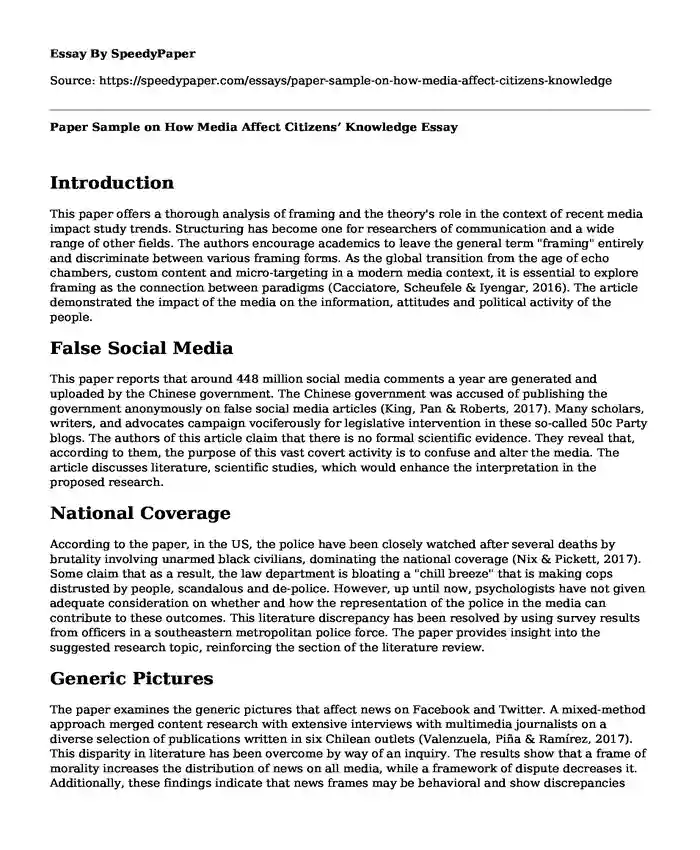
| Type of paper: | Essay |
| Categories: | Media |
| Pages: | 3 |
| Wordcount: | 733 words |
Introduction
This paper offers a thorough analysis of framing and the theory's role in the context of recent media impact study trends. Structuring has become one for researchers of communication and a wide range of other fields. The authors encourage academics to leave the general term "framing" entirely and discriminate between various framing forms. As the global transition from the age of echo chambers, custom content and micro-targeting in a modern media context, it is essential to explore framing as the connection between paradigms (Cacciatore, Scheufele & Iyengar, 2016). The article demonstrated the impact of the media on the information, attitudes and political activity of the people.
False Social Media
This paper reports that around 448 million social media comments a year are generated and uploaded by the Chinese government. The Chinese government was accused of publishing the government anonymously on false social media articles (King, Pan & Roberts, 2017). Many scholars, writers, and advocates campaign vociferously for legislative intervention in these so-called 50c Party blogs. The authors of this article claim that there is no formal scientific evidence. They reveal that, according to them, the purpose of this vast covert activity is to confuse and alter the media. The article discusses literature, scientific studies, which would enhance the interpretation in the proposed research.
National Coverage
According to the paper, in the US, the police have been closely watched after several deaths by brutality involving unarmed black civilians, dominating the national coverage (Nix & Pickett, 2017). Some claim that as a result, the law department is bloating a "chill breeze" that is making cops distrusted by people, scandalous and de-police. However, up until now, psychologists have not given adequate consideration on whether and how the representation of the police in the media can contribute to these outcomes. This literature discrepancy has been resolved by using survey results from officers in a southeastern metropolitan police force. The paper provides insight into the suggested research topic, reinforcing the section of the literature review.
Generic Pictures
The paper examines the generic pictures that affect news on Facebook and Twitter. A mixed-method approach merged content research with extensive interviews with multimedia journalists on a diverse selection of publications written in six Chilean outlets (Valenzuela, Piña & Ramírez, 2017). This disparity in literature has been overcome by way of an inquiry. The results show that a frame of morality increases the distribution of news on all media, while a framework of dispute decreases it. Additionally, these findings indicate that news frames may be behavioral and show discrepancies between journalists and the ‘‘consumers’’ preference structure. This article offers knowledge to be used in providing suggestions on the necessary media reforms.
Conclusion
Thus, this paper claims that public engagement in politics relies on their unique views of influence and not just factual policy awareness. The attention of the media affects individual expectations as informed and able to analyze political problems (Weber, & Koehler, 2017). Incomprehensible news materials subtract from the sense of political competence of people, whereas understandable news materials improve citizens' comprehension and judgment without contributing inherently to political learning. An online analysis indicates that a coherent pattern regulates the association expected. This study will provide background information on critical media reforms for future studies since they present awareness, attitudes and political actions of the people.
References
Cacciatore, M. A., Scheufele, D. A., & Iyengar, S. (2016). The end of framing as we know it and the future of media effects. Mass Communication and Society, 19(1), 7-23.
King, G., Pan, J., & Roberts, M. E. (2017). How the Chinese government fabricates social media posts for strategic distraction, not engaged argument. American political science review, 111(3), 484-501.
Nix, J., & Pickett, J. T. (2017). Third-person perceptions, adverse media effects, and policing: Developing a theoretical framework for assessing the Ferguson effect. Journal of Criminal Justice, 51, 24-33.
Valenzuela, S., Piña, M., & Ramírez, J. (2017). Behavioral effects of framing on social media users: How conflict, economic, human interest, and morality frames drive news sharing. Journal of Communication, 67(5), 803-826.
Weeks, B. E., Ardèvol-Abreu, A., & Gil de Zúñiga, H. (2017). Online influence? Social media use, opinion leadership, and political persuasion. International Journal of Public Opinion Research, 29(2), 214-239.
Weber, M., & Koehler, C. (2017). Illusions of knowledge: Media exposure and citizens’ perceived political competence. International Journal of Communication, 11, 17.
Cite this page
Paper Sample on How Media Affect Citizens' Knowledge. (2024, Jan 01). Retrieved from https://speedypaper.net/essays/paper-sample-on-how-media-affect-citizens-knowledge
Request Removal
If you are the original author of this essay and no longer wish to have it published on the SpeedyPaper website, please click below to request its removal:
- Free Essay: Multimodal Analysis Theory on the Example of Shawshank Redemption
- Free Essay Example about Pixar
- Essay Example: Film Media Development in the Digital Age in China
- Fiction & Reality in Filmmaking: Exploring the Thin Line
- Navigating Youth Culture: Societal Influences, Trends, and Challenges - Free Essay
- Gattaca and Harrison Bergeron - Free Paper Example
- Essay Sample on Video Game Industry
Popular categories




